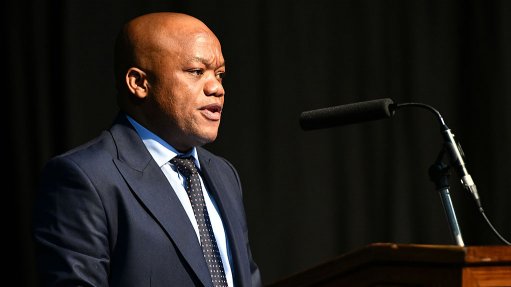
Public Works and Infrastructure Minister Sihle Zikalala
The Department of Public Works and Infrastructure (DPWI) and the Ministry of Electricity, supported by National Treasury’s Government Technical Advisory Centre, will publish the request for proposal (RFP) for the first procurement round under the Integrated Renewable Energy and Resource Efficiency Programme (iREREP) next week.
The programme was gazetted as Strategic Integrated Project (SIP) 28: Photovoltaic (PV) and Water Savings on Government Buildings, in July 2020 as part of the Cabinet-approved Infrastructure Investment Plan.
It aims to procure private sector energy service companies to deploy energy efficiency, water efficiency, alternative waste management and embedded solar PV and other renewable energy solutions throughout the department’s significant property portfolio.
“It will be the largest programme for the procurement of renewable energy and resource efficiency for public facilities on the African continent,” says Public Works and Infrastructure Minister Sihle Zikalala, noting that a conference will be held on May 18, at a yet-to-be-determined venue, to unpack a detailed departmental plan.
The DPWI, the largest property owner in South Africa with 37-million square metres across more than 92 000 facilities, consumes a significant amount of electricity and water and generates a significant amount of waste.
According to the iREREP website, recent studies estimate electricity and water consumption of about 4 021 GWh and 39-million kilolitres respectively – equating to an average yearly expenditure on electricity and water of R2.4-billion and R1.8-billion respectively – with over 822 kilotons of waste generated.
“The release of this Phase 1 RFP comes at an opportune moment, with government remaining steadfast in eradicating the electricity and water supply challenges, and the rampant landfill shortages our country continues to face,” Zikalala told media during a press briefing on Tuesday.
“The iREREP has the potential to achieve significant savings in government expenditure and contribute towards socio-economic transformation over its 30-year term.”
The programme will introduce up to 3 740 MW of equivalent capacity through renewable energy and energy efficiency initiatives, while saving 47-million kilolitres of water and reducing waste to landfill by one-million tonnes.
“By alleviating at least 3 740 MW from the national grid through the programme’s energy efficiency and renewable energy interventions, the government building portfolio could potentially add the same capacity as two Koeberg power plants and reduce loadshedding by three to four stages,” he highlights.
The programme is expected to reduce energy use intensity by between 22% and 45% in the public sector; reduce water use intensity by between 30% and 55%; reduce waste and divert 50% of current waste from landfill sites; and reduce carbon dioxide emissions and other greenhouse-gas emissions by over 54.5-megatonnes.
The projected socioeconomic benefits from the programme include up to R1.3-trillion direct contribution to South Africa gross domestic product; the creation of over 13 100 new small businesses; the creation of an estimated 503 000 jobs; and skills development opportunities for more than 475 000 people.